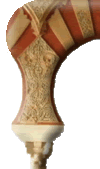

The Uprising against Yezid in Makkah and Madinah; Abdullah's Stubborn Fight against Umayyad Army; Death of Yezid – 682-683CE
The elimination of Hussain رضي الله عنه did not bring peace for Yezid. Although Hussainرضي الله عنه was out of the way in his assertion to the Caliphate, the brutality of what had happened at Karbala had created an immense reaction against Yezid. Madinah, which had cherished the Prophet صلى الله عليه و سلم and his descendants, openly revolted in the autumn of 682 against the Umayyad rule from Damascus. Feelings were running so high that Yezid sent a special governor to calm the situation. When this failed, Yezid sent an army of 12,000 in August 683 under Muslim رضي الله عنه (son of Uqba, first conqueror of north Africa) into Hijaz in order to quell the uprising. The madness, though brave and deeply committed to their cause, were no match for the trained Syrian army, and were defeated in a desperate battle at a place called Harrah, a lava field, just north of the city. The army then moved south to Makkah where Abdullah ibn Zuhair رضي الله عنه , the son of a distinguished Companion who had fought against Ali رضي الله عنه and been slain in the 'Battle of the Camel' (656), had installed himself as Caliph, but Muslim died on the way.
He was succeeded in command by Hussain ibn Numair رضي الله عنه , who besieged Makkah in September 683 from the surrounding hills. There was a great deal of fighting in the following two months and the Ka'aba itself was stoned. In the ensuing fire, the Ka'aba was badly damaged and the Black Stone was split into pieces. However, the death of Yezid in November, 683 made his army lift the siege and return to Damascus, leaving Arabia under the sway of the defiant Abdullah. Yezid was about thirty-eight years old at the time of his death. A complete rebuilding of the Ka`aba was undertaken by Abdullah, who tied the pieces of the Black Stone together and put it back in its place.
It was just over fifty years since the Prophet Muhammad صلى الله عليه و سلم had died, but there were still some people in Madinah who had been Companions of the Prophet صلى الله عليه و سلم . There was also a strong tradition of puritan religious zeal in the city going back to the days of early Islam. The storming of the holy cities by the Damascus army was considered yet another act of sacrilege by the Umayyads. They had become unpopular in this part of the empire and were looked upon as impious by the self-righteous community. Given this widespread indignation, Abdullah [d. 6921, with far less impressive credentials for the Caliphate than Hussain رضي الله عنه , proved to be a more dangerous adversary for the Umayyads in a bloody and protracted struggle.
Three Rival Claimants to the Caliphate
There was a period of anarchy lasting two years immediately following Yezid's death. Then suddenly, there were three rival aspirants to the Caliphate in different parts of the empire. Yezid had left behind as his heir a sickly boy of thirteen, who was acclaimed in Damascus as Muawiya II. Abdullah ibn Zubair رضي الله عنه was acknowledged as Caliph in Hijaz, and Ubaidullah رضي الله عنه in Basra where he had been viceroy of the eastern half of the empire, including Basra, Kufa and the whole of Persia, for two years. He had been promoted to this post by Yezid a few months after the massacre at Karbala in 680; his father Ziyad had held the same position a few years previously during the reign of Muawiya I.
When Abdullah tried to gather support for his cause outside Arabia and pressed his claim to the Caliphate in Basra, it led to civil strife, on tribal lines, between his supporters and those of Ubaidullah رضي الله عنه . At this juncture, Ubaidullah رضي الله عنه , who had become an object of hatred in Iraq for the brutal massacre of Hussain at Karbala and the severity with which he kept people in subjection, fled to the safety of Damascus.